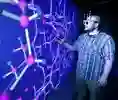




Gain the in-depth specialist knowledge and skills you need to thrive in one of the fastest moving industries in the world on this British Computer Science-accredited Masters.
You’ll advance your technical skills and expertise, taught within our industry-standard facilities. Learn specialist computational concepts, programming techniques and fundamental theories. And put your knowledge into practice, designing applications and developing real software.
Computer science has increasing influence on our lives and the demand for highly skilled practitioners in this dynamic sector continues to grow.
About this course
Be a part of the technological breakthroughs of today that will shape the way we live tomorrow.
Enhance your core computer science skills with practical learning in our state-of-the-art computer labs, working with the latest software such as Visual Studio Enterprise Edition. Take part in live programming and problem-solving workshops, creating software solutions. And choose from a range of topics to suit your career interests such as artificial intelligence (AI), multiple reality, real-time graphics, web-connected systems and robotics.
You’ll consider the importance of ethics for practising computer scientists. And benefit from our strong industry links with organisations such as IBM, Microsoft and Jaguar Land Rover. Our Rather Useful Seminar series features guest talks by experts from across industry.
Boost your CV by taking part in our other extra-curricular opportunities including hackathons and competitions like the Global Game Jam, UK and Ireland Programming Competition and Three Thing Game.
This programme supports students with various levels of computing and programming practice experience but is particularly suited to those experienced in writing code at undergraduate level.

Advanced Computer Science
2 mins
Module options
For a full Masters degree, you'll study 180 credits over the duration of your course. Some programmes offer a Postgraduate Diploma (PGDip) qualification or a Postgraduate Certificate (PGCert) qualification. For a PGDip, you'll study 120 credits, and for a PGCert, you'll study 60 credits.
Filters
MSc Dissertation
Your MSc Dissertation is your chance to spend a full third of your study time working on a topic of interest to you, and producing something major as a result. You can design your own project, working with a member of staff to develop an idea. Perhaps you will develop an AI program, do some research in virtual reality, or build a new robot butler – the choice is yours.
With regular support from a supervisor, you’ll learn to create, undertake, evaluate and report on a significant individual project which you’ll be proud to show off to an employer or perhaps provide a stepping stone into further research.
core
60 credits
Cutting Edge Concepts
This module enables review of cutting-edge and emerging concepts and methods across the spectrum of computer science. We will meet as a reading group to select, review and discuss academic publications of high quality, that take topics beyond the curriculum and into the current state of the art; students will learn how to read and review academic materials critically.
compulsory
20 credits
Commercial Development Practice
CDP is a reach-out project of the School of Computer Science, where we work on real commercial software for real clients. With the support of academic and specialist staff, our software development teams provide commercial software development services to customers with bespoke software development needs.
This excellent opportunity gives you critical experience of working professionally with clients across the entire software project lifecycle from customer brief through to specifying, designing, developing and testing software using industry-standard technologies and techniques. Employers tell us they are actively looking for candidates with experience applying the project management methodologies, frameworks and tools that you will explore, use and hone during your time in CDP.
Graduates tell us that their experiences are highly sought after in industry, and you will certainly end up with lots to put on your CV and talk about in job interviews!
compulsory
40 credits
Trustworthy Computing
Given how much we depend on networked digital technologies, cybersecurity is a threat that can impact us all at any time. In this module you will explore how simple mistakes can make a software system exploitable and insecure and demonstrate how these flaws can be fixed to make a system cybersecure.
optional
20 credits
C++ Programming and Design
Explore how to create efficient, robust, interactive graphics applications in C++ on modern CPUs. By linking with Real-time Graphics, you will gain the opportunity to development larger and more interesting applications, which will form the centre piece of any personal portfolio.
optional
20 credits
Real-Time Graphics
In this module you will gain practical experience of writing programmes that run on dedicated graphics hardware, that enables huge amounts of data to be processed at the same time in a highly parallelised architecture. You will write software from the ground up, setting up the pipeline, loading data into the buffers, writing shader code and making render calls that result in 3D environments that are commonplace in the modern games industry.
optional
20 credits
Object Oriented Design and Development Using C#
The aim of this module is to give the student a good grounding in the design and implementation of software using a modern, object-oriented programming language. On successful completion of this module, students will be able to demonstrate knowledge and understanding of object-oriented design and development in the C# programming language.
optional
20 credits
Component Based Software Engineering Practice
Modern large scale software development can be improved through utilising advanced approaches such as component based development. Reliable and secure software can be supported through managed programming environments. This module will be your chance to look deeper at these virtual machines beneath and see what makes it all work, and to develop solutions utilising component libraries.
optional
20 credits
Dependable Reactive Real-time Systems
Complex new technological systems including robotic and autonomous systems are employed in tasks that have high dependability requirements, i.e. require the system to be safe and perform its tasks uninterrupted by failures. Dependability, therefore, is a property that must be designed well. These systems are typically reactive, i.e. they respond to changes in the environment, and use concurrency and parallelism to achieve their tasks.
The module focuses on these specific aspects of dependable, reactive, and real-time design, and introduces students to the appropriate concepts and design methods. It focuses on design of single systems and goes further to discuss specific challenges encountered today in the design of cooperative and multi-robot systems, i.e. system teams and swarms that use collaborative and social intelligence to carry out tasks beyond the competency of a single system.
optional
20 credits
Our academics
You’ll be taught by talented researchers whose specialist areas include computational science; computer gamification; dependable intelligent systems; robotics and artificial intelligence; and simulation and visualisation.

Dr David Parker
Lecturer in Computer Science
David loves using software to solve problems and oversees many of our game jams and programming competitions such as the Three Thing Game and the Global Game Jam. His research focuses on improving characteristics of safety-critical systems.

Dr John Dixon
Lecturer in Computer Science
John is a computer science researcher, lecturer and software engineer and developer. He specialises in networking, connected services and distributed systems, C# and .NET. He’s developed mission-critical solutions for the fire and rescue services.
Entry Requirements
What do I need?
When it comes to applying for this Postgraduate Taught degree, you'll need an Undergraduate degree (or equivalent). For this course, you'll need a 2:2 from a relevant bachelor's degree.
The programme is designed for graduates who have a studied a subject that is relevant to this course.
If you’re an undergraduate student at Hull, you’re guaranteed a fast-track route to this postgraduate degree, as long as you meet the entry requirements.
In order to ensure our students have a rich learning and student experience, most of our programmes have a mix of domestic and international students. We reserve the right to close applications early to either group if application volumes suggest that this blend cannot be achieved.
Typical offer
2:2 in a relevant subject area
A minimum 2:2 Bachelor Honours (or international equivalent) in Computer Science or Software Engineering with at least 40 credits (or equivalent) of a high-level objected oriented programming language such as Java, C++ or C#.
Fees & Funding
How much is it?
Scholarships
We offer a number of awards, bursaries and scholarships for eligible students. They’re awarded for a variety of reasons including academic achievement and/or to help those on lower incomes.
Scholarships and bursaries are separate to student loans. And the best bit is, you don’t pay a penny back.
Alumni Postgraduate Scholarship
University of Hull undergraduates progressing to a taught masters course may receive a 20% discount on the cost of their tuition fees.
Find out if you’re eligible by visiting the University of Hull Alumni Postgraduate Scholarship page.
See more Scholarships
We offer a range of scholarships and awards to students at the university to help with their financial load.
To view all of our scholarships and determine whether you're eligible, please visit our Scholarships and Awards page.
Our facilities


Future prospects
You’ll be on the fast-track to IT pro. This degree partially meets the academic requirements for Chartered IT Professional plus partial Chartered Engineer status1.
Alongside specialist knowhow, you’ll graduate with highly prized professional skills – such as teamworking, an integral skill in commercial software development – and industry-standard project management techniques, such as Agile.
You could go on to a range of roles including software programmer, cyber security analyst, AI engineer, data scientist, mobile developer, quality assurance specialist, machine learning engineer, network specialist business systems analyst, IT manager and IT designer. Or you could go on to further study with a PhD.
Take your career to the next level
Like what you’ve seen? Then it’s time to apply.
Make your application online now, and our admissions team will get back to you as soon as possible to make you an offer.
Not ready to apply yet?
We regularly deliver virtual and on-campus events to help you discover your perfect postgraduate course, whether it’s a subject you already love or something completely different. Our events are an opportunity for you to chat to tutors and current students and find out about the career options a postgraduate degree could lead to.
You may also be interested in...
Accredited by BCS, The Chartered Institute for IT, for the purposes of partially meeting the academic requirement for registration as a Chartered IT Professional, and partially meeting the academic requirement for a Chartered Engineer.
All modules on this course page are subject to availability and this list may change at any time.